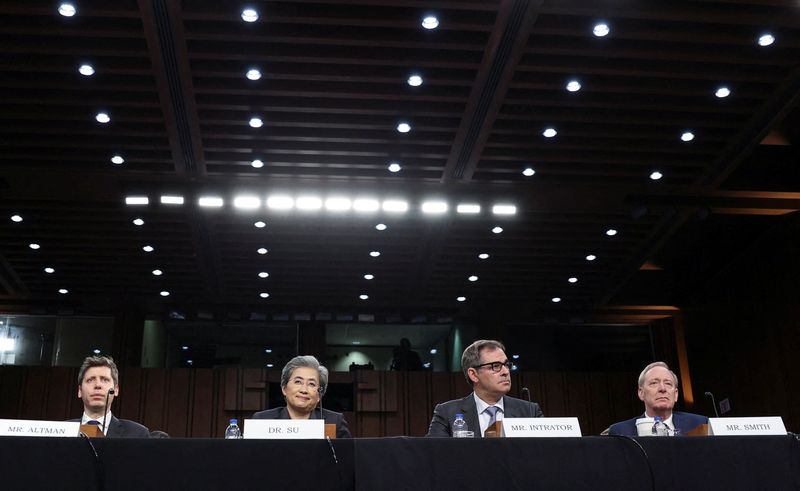By Alexandra Alper and Jody Godoy
WASHINGTON (Reuters) – Top executives at American AI giants OpenAI, Microsoft and Advanced Micro Devices said at a U.S. Senate hearing on Thursday that while the U.S. is ahead in the artificial-intelligence race, Washington needs to boost infrastructure and champion AI chip exports to stay ahead of Beijing.
The U.S. Senate Commerce Committee, chaired by Republican Senator Ted Cruz, is looking to cut regulatory barriers to U.S. artificial intelligence after China’s DeepSeek shocked the world with a high-quality, affordable AI model last year and as Huawei, long in Washington’s crosshairs, unveiled an advanced AI chip.
The U.S. tech industry has seized on those concerns to lobby the Trump administration for more favorable policies including loosened export restrictions on AI chips, arguing that promoting worldwide use of AI that reflects democratic values is a matter of national interest.
“The number-one factor that will define whether the U.S. or China wins this race is whose technology is most broadly adopted in the rest of the world,” said Microsoft President Brad Smith, adding that concerns about Chinese propaganda and personal data flows to China had driven his own company to bar employees from using DeepSeek.
“The lesson from Huawei and 5G is that whoever gets there first will be difficult to supplant,” he said.
The Chinese telecommunications equipment manufacturer, which also makes an advanced AI chip, has faced U.S. restrictions over concerns its equipment could be used to spy on users. Reuters reported last month that Huawei is ramping up to make mass shipments of advanced AI chips to Chinese customers.
Sam Altman, CEO of OpenAI, maker of flagship AI model ChatGPT, is testifying, as are Microsoft’s Smith and Lisa Su, CEO of AI chipmaker AMD. Microsoft is a major backer of OpenAI.
Altman told the panel he expects societal advances from AI to accelerate in the next few years through U.S. investment.
“Investment in infrastructure is critical,” Altman said during the hearing. The U.S. “will be not only the place where the AI revolution happens but all the revolutions after,” he said. Such infrastructure includes everything from data centers to house more servers to power stations that fuel the energy-intensive calculations needed to drive AI.
The development of AI has depended on specialized computer chips, huge amounts of data to train large-language models, vast amounts of energy and a technically skilled workforce.
Smith called for more education on AI to speed up adoption and investment in electrical infrastructure and AI research in development.
Story Continues

